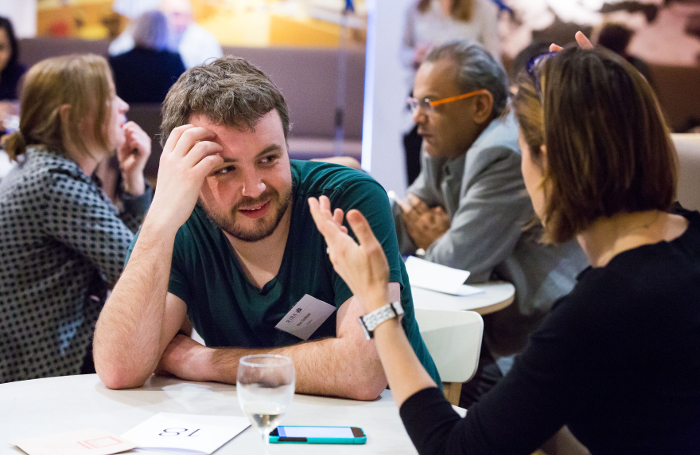Mentoring is a rewarding, enjoyable way to support the next generation of practitioners. The mentors often get as much out of the sessions as the mentees, whether they are part of a structured ongoing programme within a practice or a one-off event.
Mijail Gutierrez is Associate Principal at Perkins+Will and was a mentor at the RIBA’s most recent speed-mentoring session at the Future Leaders: Developing a Leadership Mindset event. He invariably finds that these exchanges leave both sides feeling positive and energised about their careers.
“Mentoring provides a great platform for career self-reflection, the honing of leadership skills, and cross fertilisation of ideas between participants,” Gutierrez affirms. “‘Mentees bring a variety of issues for discussion ranging from how to advance their careers to how to be a more effective leader and I am challenged every time.”
All mentors seem to agree that a successful mentoring session will steer the mentee towards their own assessment of where they are and what they want. Gutierrez’s foremost mentoring tip is to answer questions without being prescriptive, and guide mentees towards finding their own solutions.
“I engage through asking open questions that lead to self-reflection and awareness,” he explains. “My mentoring approach is to create a space in which mentees can think about what is challenging them in the context of their long-term visions and aspirations.”
He likes to encourage a dialogue through open questioning and storytelling, and suggests that sharing your professional stories can lead mentees to make unexpected connections.

“The aim always is to show not tell, and enable mentees to be more reflective, consider options, and the bigger picture,” counsels Teri Okoro, founder of North London architects, TOCA.
She provides mentorship to architects and project managers in the UK and Africa, and has found that informative anecdotes from her own experience can help in identifying what the mentee wants to achieve.
Speed-mentoring events are a fun and increasingly popular way of packing useful career advice from a range of experienced practitioners into a short space of time.
“They require mentees to be quite focused and strategic in their approach,” advises Okoro.
Gutierrez also suggests mentees do a little preparation in advance of a speed-mentoring event to clarify what you want to achieve: is it specific practical advice from a specific individual, coaching on an ongoing issue, or envisioning future steps? He points out that there is no harm in asking if a mentor would consider giving a quick follow-up session to share your progress and get feedback.
Acting as a mentor provides a ‘re-inspiration’ of sort for Jaimie Johnston, Director and Head of Global Systems at multi-disciplinary practice Bryden Wood.
“I am reminded of, and re-inspired by, the range and breadth of the careers and roles that the title ‘architect’ covers,” he enthuses. “That means young architects have almost limitless possibilities to shape their careers and find a place that suits their particular interests and abilities.”
This in itself can be a daunting prospect for early career architects. Many architects might be unsure whether or not to specialize in a particular sector, try to secure a position at a large, across-the-board practice, or even strike up on their own.
“I hope I am able to give some assurance that following a path that interests you or feels ‘right’ will take you somewhere interesting,” avows Johnston. “You don’t necessarily need to immediately decide on your final destination.”
His sessions as a mentor have prompted some career reflection of his own.
“I found it interesting to look back on my own career and share how it unfolded, some of the choices I made, and which were the critical moments,” he reveals. “I realized that it wasn’t always clear at the time that they were.”
The third of this year’s RIBA Future Leaders events, Leading Change, will take place at the RIBA, 66 Portland Place, London W1B 1AD, on 18 July 2019.
It will be followed by a speed-mentoring session. This is only open to Future Leaders ticket holders and must be pre-booked. Tickets are now on sale.
Thanks to Mijail Gutierrez, Associate Principal, Perkins+Will; Teri Okoro, Practice Principal, TOCA; Jaimie Johnston, Director and Head of Global Systems, Bryden Wood.
Text by Neal Morris. This is a Professional Feature edited by the RIBA Practice team. Send us your feedback and ideas
The RIBA offers guidance and case studies on the mentoring process as well as a Speed Mentoring Toolkit for anyone thinking of holding an event.
RIBA Core Curriculum Topic: Business, clients and services.
As part of the flexible RIBA CPD programme, Professional Features count as microlearning. See further information on the updated RIBA CPD Core Curriculum and on fulfilling your CPD requirements as an RIBA Chartered Member.
Posted on 2 May 2019.









